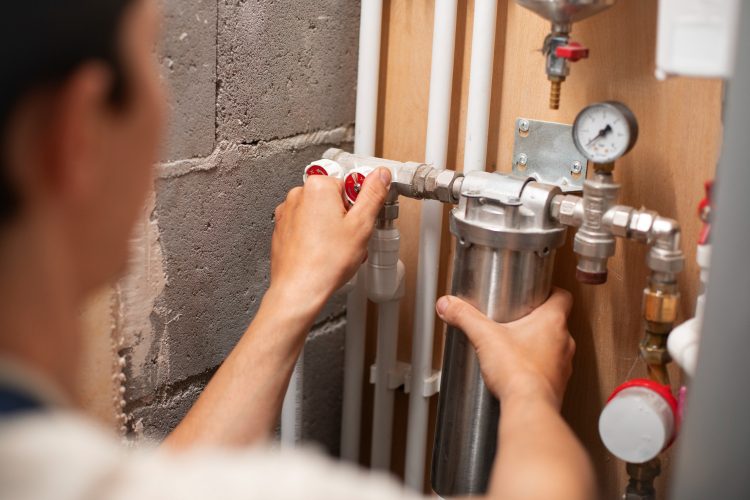In the realm of bathroom renovations, the selection of an appropriate hot water system is pivotal. A dependable hot water supply significantly enhances daily routines, from showers to handwashing, underscoring its importance in every household. Integrating a suitable hot water system during your bathroom renovations ensures comfort, efficiency, and long-term satisfaction.
Types of Hot Water Systems for Bathroom Renovations
Electric Hot Water Systems
Electric hot water systems are a popular choice for many homeowners due to their straightforward operation and relatively low initial cost. These systems heat water using electrical elements, providing a steady supply of hot water.
Pros:
- Quick and easy installation.
- Suitable for homes without gas connections.
Cons:
- Higher ongoing energy costs compared to gas and solar options.
- Dependency on electricity supply.
Electric systems are ideal for smaller households or homes without access to natural gas.
Gas Hot Water Systems
Gas hot water systems use natural gas or LPG to heat water, offering a more energy-efficient alternative to electric systems. They typically provide faster heating times and lower operational costs.
Advantages:
- Lower running costs.
- Rapid heating capability.
- Can operate during power outages.
Disadvantages:
- Higher initial installation costs.
- Requires gas connection and ventilation.
Gas systems are suitable for larger households with higher hot water demands and existing gas connections.
Solar Hot Water Systems
Solar hot water systems harness energy from the sun to heat water, making them an eco-friendly option. These systems can significantly reduce energy bills and environmental impact.
Benefits:
- Substantial energy savings.
- Reduced carbon footprint.
- Potential government rebates and incentives.
Installation Requirements:
- Sufficient roof space for solar collectors.
- Backup system needed for cloudy days.
Solar systems are best for eco-conscious households in sunny regions looking to minimise energy costs.
Heat Pump Hot Water Systems
Heat pump hot water systems extract heat from the air to warm water, making them highly energy-efficient. They can be up to three times more efficient than conventional electric systems.
How They Differ:
- Utilise ambient air heat.
- Lower energy consumption.
Benefits:
- High energy efficiency.
- Lower operational costs.
Drawbacks:
- Higher upfront costs.
- Performance can be affected by external temperatures.
Heat pump systems are ideal for those seeking energy efficiency and willing to invest in a higher initial cost.
Factors to Consider When Choosing a Hot Water System
Energy Efficiency
Energy efficiency is crucial in bathroom renovations. Opting for an efficient hot water system reduces energy bills and environmental impact. Compare the efficiency ratings of different systems to find the best fit for your needs.
Cost of Installation and Maintenance
Understanding the full cost of installation and maintenance is essential. While some systems have lower upfront costs, they might incur higher running expenses. Consider both the initial investment and long-term maintenance to make a cost-effective choice.
Household Size and Hot Water Demand
Assess your household’s hot water usage to ensure you select a system with adequate capacity. Larger families or households with high hot water demands might require more robust systems, whereas smaller households can opt for less powerful solutions.
Space and Location Constraints
Different hot water systems have varying space requirements. Ensure you have adequate space for installation and consider whether an indoor or outdoor setup is more suitable for your home.
The Role of a Home Plumber in Hot Water System Installation
Why You Need a Professional Home Plumber
Engaging a professional home plumber for your bathroom renovations is crucial, particularly when installing or upgrading hot water systems. A qualified plumber ensures that the installation complies with local building codes and safety standards, mitigating the risk of leaks, water damage, and other potential issues. They possess the expertise to handle complex plumbing tasks, ensuring that your hot water system operates efficiently and reliably.
How to Find a Reliable Home Plumber
Finding a dependable home plumber is essential for the success of your bathroom renovation project. Here are some tips to help you select the right professional:
- Check Qualifications and Licenses: Ensure the plumber is licensed and certified to perform the work.
- Read Reviews and Testimonials: Look for feedback from previous clients to gauge the plumber’s reliability and quality of work.
- Request References: Ask for references and follow up with past clients to get an idea of their experience.
- Get Multiple Quotes: Obtain quotes from several plumbers to compare prices and services offered.
- Verify Insurance: Ensure the plumber has adequate insurance coverage to protect against potential damages or accidents.
What to Expect During Installation
When you hire a home plumber for your hot water system installation, understanding the process can help you prepare adequately and set realistic expectations.
- Initial Consultation: The plumber will assess your current setup, discuss your hot water needs, and recommend suitable systems.
- Quotation and Agreement: You’ll receive a detailed quote outlining the costs and scope of work. Ensure you agree on all terms before proceeding.
- Preparation and Planning: The plumber will prepare the site, ensuring all necessary materials and tools are ready. This may involve shutting off water supply and clearing the installation area.
- Installation Process: The installation involves removing the old system (if applicable), setting up the new hot water system, and connecting it to your plumbing and power supply. The plumber will test the system to ensure it’s functioning correctly.
- Final Inspection: A thorough inspection is conducted to verify that the installation meets all safety standards and operates efficiently. The plumber will also provide maintenance tips and answer any questions you may have.
Integrating Hot Water Systems into Your Bathroom Renovation
Planning the Layout
Incorporating the hot water system into your bathroom renovation layout is essential for seamless integration. Consider the following:
- Accessibility: Ensure the system is easily accessible for maintenance and repairs.
- Aesthetic Integration: Choose a system that complements your bathroom design without compromising on functionality.
- Space Efficiency: Utilise available space effectively, especially in smaller bathrooms.
Upgrading Existing Systems
If you have an outdated hot water system, upgrading during your bathroom renovation can enhance efficiency and performance. Modern systems are more energy-efficient and offer improved functionality, making them a worthwhile investment.
Ensuring Compliance with Local Regulations
It’s imperative to ensure your hot water system installation complies with local building codes and regulations. A professional home plumber will be familiar with these requirements and ensure your installation meets all legal standards, avoiding potential fines or issues down the line.
Choosing the right hot water system for your bathroom renovation is a significant decision that impacts your daily comfort and energy consumption. your needs.
Investing in a suitable hot water system during your bathroom renovation ensures long-term satisfaction and efficiency. With the right planning and professional assistance, you can create a bathroom that not only looks great but functions perfectly for years to come.









